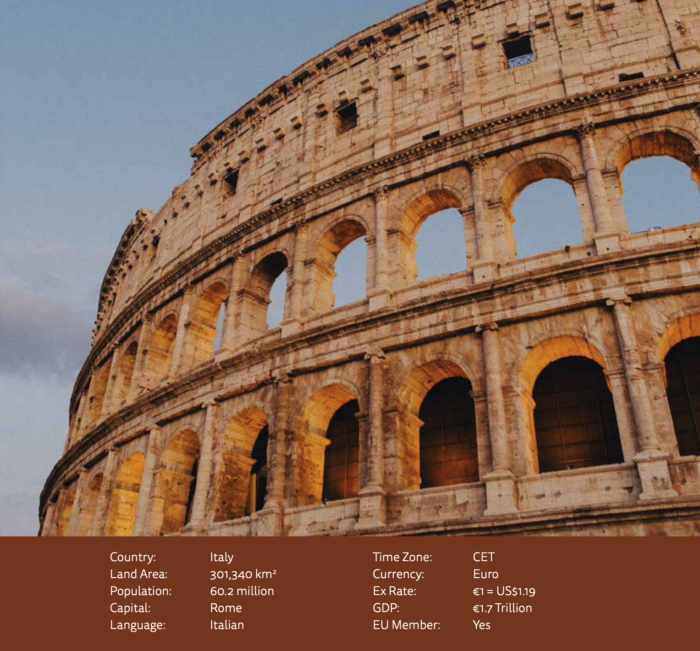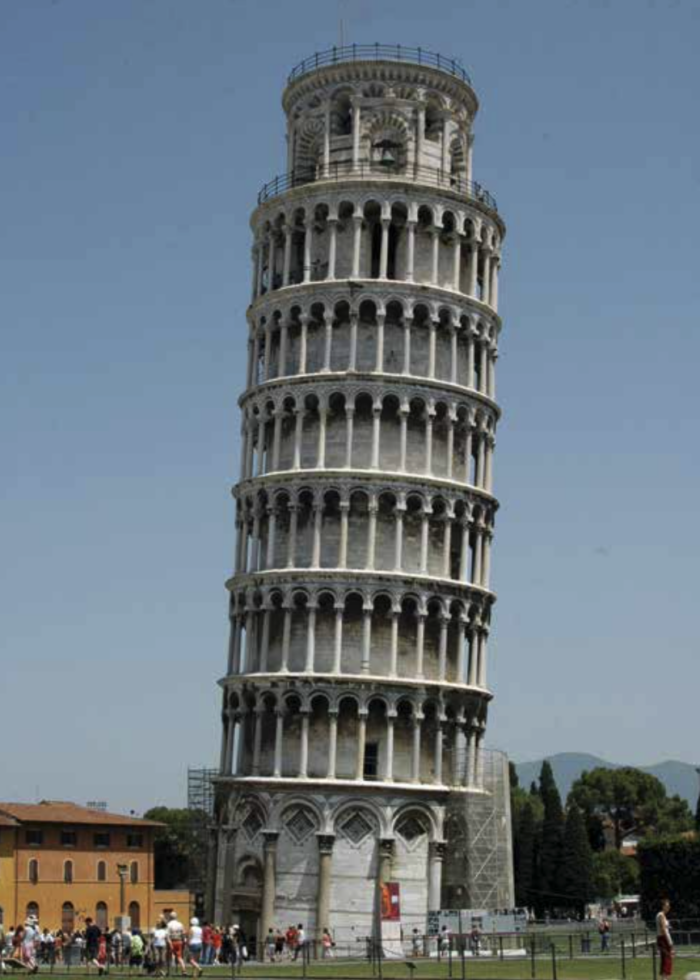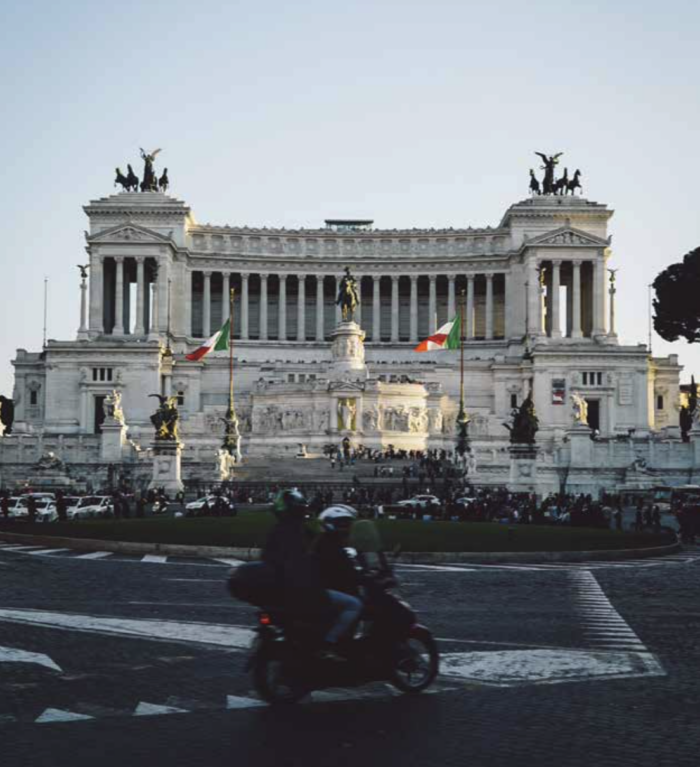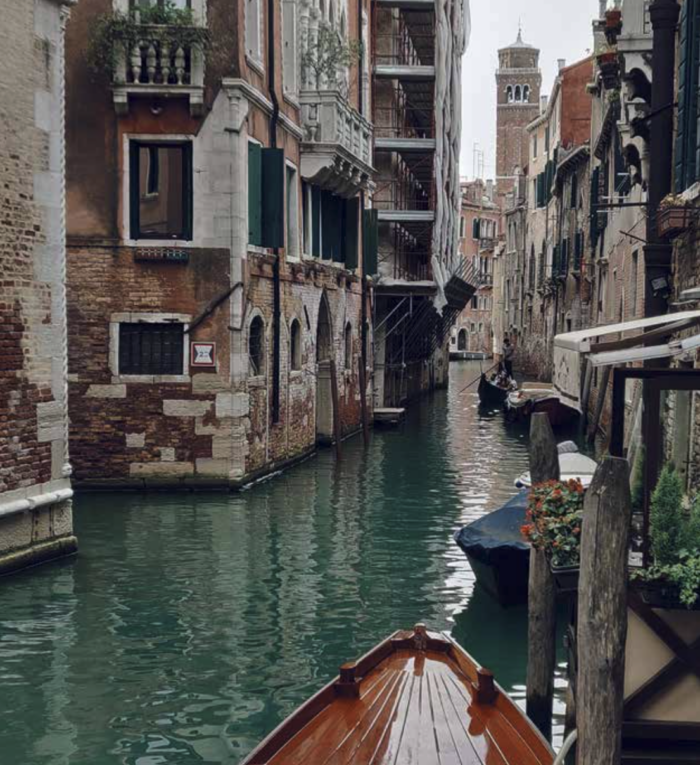
The Roman Empire was founded in 27 BC and Augustus Caesar proclaimed himself emperor of Rome in 31 BC. At its height, the Roman Empire stretched from north-western Europe to the Near East and included all of the lands in the Mediterranean. After the Roman Empire broke down in 395 AD, there were many separate kingdoms and city states in Italy. The country was not unified at all and only became one nation in 1861. The process of unification actually lasted another ten years as more regions joined the union including the islands of Sicily and Sardinia and this became known as the “Kingdom of Italy”. The Kingdom lasted until 1946.
During the Second World War, Italy’s Prime Minister Benito Mussolini sided with the German Nazi regime. After the Allies liberated Italy in 1945, two days after the fall of Berlin, Mussolini feared for his life as the Italian people had turned against him and he did not wish to be captured by any of the Allied forces. He attempted to escape with his mistress to neutral Switzerland but was captured and executed by partisans. After his death, the Italian Republic was formed in 1946.
Today, Italy has the third largest economy in the EU and is Europe’s largest producer of luxury goods.
Principal Industries in Italy
The main industries in Italy are comprised of electronics, manufacturing, textiles, pharmaceuticals, tourism and agriculture.
Other Important Industries
Industry in Italy makes up 25% of the Italian GDP and employs 29% of the workforce. The main activities are engineering, fashion and automobiles. Engineering makes up 42% of Italian secondary industries. These factories specialise in the production of complex machine parts, metallurgic and mechanical processes, semi-finished goods, paints, cutting and carpentry.

Doing Business in Italy
Located at the centre of the Mediterranean Sea, Italy gives businesses a strategic gateway to consumers across the European Union, Northern Africa and the Middle East. It is also a primary hub that links southern, central and eastern Europe. And, as a member of the European Union, businesses in Italy have duty-free access to over 450 million consumers in over 30 national markets within the EEA.
With a robust manufacturing base and a tradition of innovation, Italy is among the largest manufacturing countries in Europe, second only to Germany. Products made in Italy continue to enjoy a reputation for high quality and luxurious design. It is also one of only five countries with an export trade surplus. Italian manufacturers are keen to protect this export advantage by investing in advanced manufacturing technologies that improve production and reduce costs, including industrial automation, robots and manufacturing.
Italy has some world-class universities, which means they have an educated workforce coming online every year. With this in mind, Italy is developing a network of innovation incubators as well as science and technology parks, many of which are connected to universities and local development agencies. This has encouraged thousands of start-ups to bring new knowledge and new technologies into the market.
The View from the Ground
When describing a country and its culture, you can write down all the facts and figures you like but if you want the full story, you need to get the perspective of someone with a lived experience of being there. That’s why we’ve asked Sofia to give us her take on what it’s like to live and work in Italy.
Probably the first thing you should know about doing business in Italy is that you shouldn’t get too hung up on punctuality. I know that with the Italians this is a bit of a cliché and a stereotype but I’m sorry to confirm it’s true. We are not too worried about being perfectly on time and definitely, we’d never be at a meeting in advance. That kind of behaviour just makes you look like you’re weird so yeah, be prepared for more relaxed times I would say.
In Italy, there is almost a generation gap when doing business. Normally, we are polite people anyway, but the older generation are very attentive to using the polite form of “you”. Whereas with my generation, it sounds a bit stuffy and old fashioned to be addressed that way. So, I think you always need to be cautious at first and use the polite form, then if the person is open to using the regular “you” you can adapt but yeah, the formal is still the most commonly used one.

Italian food is known all over the world but in Italian business, what really gets everyone’s attention in the office is the coffee break. There is a special reverence reserved for coffee in Italy, so we have it at least twice per day, one in the morning and one in the afternoon. It’s very common. I mean, now in Covid times of course it’s different but when in the office, we all go together to the bar and have a coffee, or we have one outside. When we bring food to the office, it will very likely be shared and probably be for an occasion like a birthday for example. Or on special days, people like to bring it and we’ll have dinner together once in a while at the restaurant.
I know the broodje kaas is very popular in the Netherlands, but I think Italians appreciate more simple things like a Focaccia for example, which is a type of bread. Another thing though is that we do not go in for sauces so much. I noticed in Germany and in the Netherlands, there are a lot of sauces used and in Italy we aren’t used to that. We don’t really even use butter, we just have the snack with salad, some tomatoes and ham. The simpler the better I would say.
The economic differences between the north and the south have been well documented but there is also a difference in mentality. It’s a big difference too. So, the northern people are much, as they say, colder at least at first glance. They don’t like to touch you physically; they stay pretty distanced but still they are quite polite, but if you show too much warmth they get suspicious. They think you want something from them. Then, on the other hand, the people from the south are totally the opposite. They want to hug you; they give you food and they invite you to their home. They are really hospitable and also, they are loud. They use many more hand gestures than we do and are very expressive and dramatic, but in a good way. I think the weather may even have an influence on their mentality. Because the weather is nice, they go out more and the squares in Italy are an institution. People like to meet there to sit on the benches and it’s really like their second home. They share beverages there and it’s like they need these social moments all the time. They also try to recreate this in the office.
While the Italians get on with most countries around the world, we do have a certain rivalry with France. We believe that they think they are above everybody else, they think they are so elegant and the best at everything. I wouldn’t say that Italians can’t stand French people, but we do always have this little thing. For example, where I’m from in the north, there’s a city called Turin that’s really close to the French border and we even still have a dialect that is very similar to French, so we are a bit more familiar with the people and their culture. But, in the rest of Italy or regarding football, France – no way! I’m half joking of course but we do have an issue related to our history and art. We’re not impressed that the most famous painting in the world, The Mona Lisa, done by Italian, Leonardo da Vinci, is hanging in the Louvre in Paris. Besides that, there’s nothing that would stop us from doing business with one another.
Cultural differences can occasionally cause a bit of confusion. From my personal experience, I worked for a company in Dusseldorf, which did business development. The CEO was Italian and then the vice president was German, and it was very difficult for them to find common ground on a working style and philosophy. As I mentioned earlier, for the Italians it is normal to be late for a meeting and to be relaxed and to take a lot of breaks while for the German, this was incomprehensible. For a German, business is business, it’s a duty, you have to be on time and respect the rules. And, while I haven’t had the exact same experience here, it could potentially happen with a person from the north trying to do business with someone from the south and vice versa. In general though, we are relaxed, and we like to be easy-going among the colleagues and maybe in the south it’s even more relaxed so, we Italians from the north, we feel like Germans.

As far as the tech sector is concerned, it’s a big struggle in the south of Italy, because they are often late in delivering things. It’s difficult for them to stay up-to-date and this is a sector that never stands still. Plus, in terms of priorities, they need a better infrastructure, better healthcare and many more things before developing big tech solutions. But, in the north, at the moment Milan is the most developed city and is also the city of the businessman. So, if you go there, you will always see these very elegant Italians. There, they like to dress up to go to work and they are very business oriented. There are also a lot of cool cafés for this kind of lifestyle.
There is a hierarchical structure in Italian companies that makes it difficult for you to make decisions if you aren’t a manager, so you always need to be dependent on these people if you want to move forward. The hierarchy system is pretty strong but it’s very old fashioned. A lot of people would like a more modern system, but this is the way it is for now and it’s up to the younger generations to lead the change.
Maternity leave is a big topic in Italy. A lot of women are unhappy with how it works because they have only a few months and they’re sometimes asked at interviews if they are planning on getting pregnant. It is of course, completely against the law to ask these types of questions, but it still happens. You can see numerous accounts of it on social media and LinkedIn. It gets talked about a lot and they are looking to change things.
For women in Italy there are a lot of limited contracts that are only for a specific amount of time, like apprenticeship / internship and other types. So, the biggest struggle is to get the unlimited contract and still manage to pursue your personal goals like starting a family. These days, it’s common for women to go to university, which means they are not going to start working until 26 or 27. Also, if they do a master’s, they’ll be coming out of university at an age where people want to have a family. But, because women aren’t getting these unlimited contracts, they feel very challenged by this and they are also tired of this situation.

One thing that’s really good is the work life balance in Italy. I think it’s a positive aspect and good for your mental state to be more relaxed and take a lot of breaks. Although, there is this thing in Italy about always wanting to show you are at your desk and working more than your set hours. Being physically present is still a big thing, even if you’re just there and not actually working. If you could do the same amount of work in less hours, that would be very badly thought of. It’s like they value the quantity of hours over the quality of the work. Of course, Italy was hit very badly by Coronavirus in the first wave, and maybe you know that it’s in our culture to be very dramatic and full of feelings when we are worried, so companies didn’t hesitate to allow working from home and I think they can be proud that they were so flexible so quickly.
Appearance is very important in Italy. Being well groomed is not just a matter of pride but also part of the culture. That’s because we really love our past, our art and we want to keep up that reputation with our appearance. It’s equally important for men and we have a lot of good fashion brands that are also well regarded abroad. When someone isn’t well dressed in a business meeting, we naturally assume it’s a foreigner as an Italian wouldn’t do that. Also, loud shirts or vivid colours are not for us. In Italy, we wear neutral colours when we want to be elegant.

Business Etiquette
When doing business in Italy, having cross cultural skills should improve the potential of a successful trip. As a general guideline, work plans are often not taken too strictly, so that some flexibility can be built into a deadline. When a deadline must be firmly met, be sure to make it very clear to your Italian partner. In relation to that, punctuality is not a priority for Italians. Be patient and be prepared for some delay when you start working with a new Italian partner. In particular, do not take a small delay as a sign of a lack of respect. There are specific etiquettes and protocols for individual social and business situations, however you should remember that Italian codes of behaviour are less important than being considerate. If you can demonstrate to your partner that you understand Italian culture and etiquette, that will be greatly appreciated.
